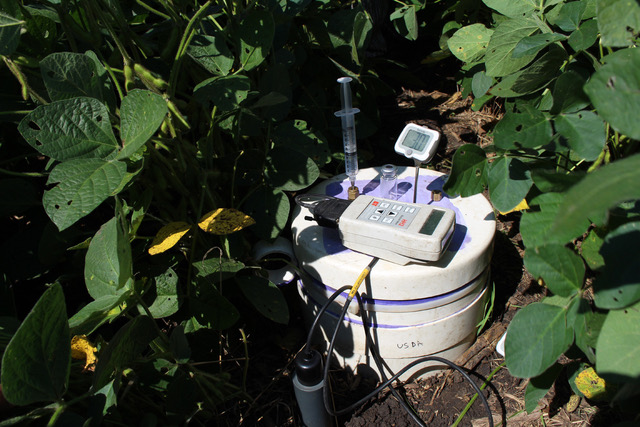
Thanks to the Soil Science Society of America for this article.
In a newly published study, researchers dug into how fertilizing with manure affects soil quality, compared with inorganic fertilizer.

Ekrem Ozlu of the University of Wisconsin-Madison and his team studied two fields in South Dakota. From 2003 to 2015, the research team applied either manure or inorganic fertilizer to field plots growing corn and soybeans. They used low, medium, and high manure levels, and medium and high inorganic fertilizer levels. They also had a control treatment of no soil additives to provide a comparison.
In the summer of 2015, they collected soil samples at a variety of depths using a push probe auger. Then they analyzed the samples.
• Manure helped keep soil pH—a measure of acidity or alkalinity—in a healthy range for crops. Inorganic fertilizer made the soil more acidic.
• Manure increased soil organic carbon for all the measured soil depths compared to inorganic fertilizer and control treatments. More carbon means better soil structure.
• Manure significantly increased total nitrogen compared to fertilizer treatments. Nitrogen is key to plant growth.
• Manure increased water-stable aggregates. These are groups of soil particles that stick to each other. Increased water-stable aggregates help soil resist water erosion. Inorganic fertilizer application decreased these aggregates.
• Manure increased soil electrical conductivity at all soil depths in comparison to inorganic fertilizer and control treatments. Higher soil electrical conductivity means higher salt levels in the soil.
Ozlu and his team concluded that long-term annual application of manure improved most soil quality properties compared to inorganic fertilizer. “Increased electrical conductivity is one of the few negative impacts of manure,” Ozlu said. “Manure is the fertilizer that supports better soil quality by improving almost all soil properties. Inorganic fertilizer is better in terms of electrical conductivity, but it does not improve other soil properties and crop yields better than manure.”
Ozlu concluded, “If you think of soil as a heart, manure is the lifeblood going through it.”
This is a poetic view of manure, to be sure. But perhaps this humble yet enormously useful substance deserves a little poetry.




Hi Kathy.
Could you ask the researchers if the increased conductivity of the manure-treated soil might be due to higher levels of organic carbon and water-stable aggregates? It would seem like the soils with these two characteristics would likely also hold more water molecules, which make me think they would have higher conductivity. (as opposed to assigning blame to higher salt content).
I’m working on getting a copy of their paper right now so I’ll let you know what I learn.
I don’t have full access to the article but wanted to do some extra reading. I don’t doubt the results, but I am curious – how did the nutrient (NPK at least) content of the manure compare to the fertilizer? Again, I don’t doubt the benefits to soil in terms of WSA, OM, and pH…but comparing soil N is not particularly meaningful if the nutrient levels applied was significantly different between forms. Kathy, got a link to the PDF itself, or can you write a bit about that? Thanks!
Kathy, Thanks for sharing this long term study, ’03 to ’15.
At our local farm coop last Sept, the manager was pushing me hard to apply his inorganic fertilizers to my pastures vs. the chicken litter we typically use.
Comments are closed.